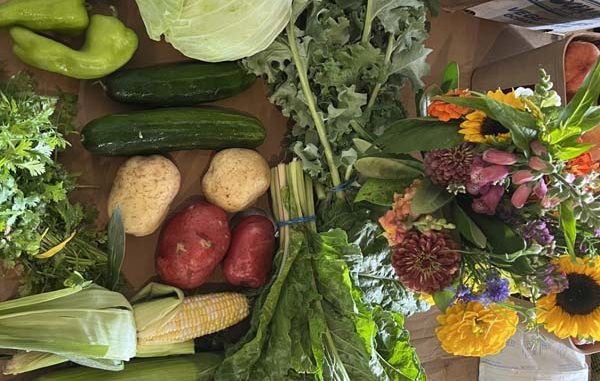
Bunches of broccoli, vibrant flowers, succulent berries and green cardboard boxes of freshly picked yellow squash are part of the homegrown produce that greets customers when they pull into farms on the North Fork, but it’s the Community Supported Agriculture (CSA) program that operates behind the farm stand that actually keeps many farmers in the green. Started in the 1980s in Japan and then migrated to Europe and the U.S.,CSAs became part of the farming community as an industry practice. Now, 40 years later, most participating farmers say adopting CSA was a savvy business decision. CSA members pay an up-front fee in the spring so that every week or so during the summer they can pick up a basket or box of a particular farm’s bounty, which ranges from strawberries to spinach in the spring to cauliflower, tomatoes, squash, melons and Swiss chard during the summer. For farmers, getting that much-needed revenue just as the seeds go into the ground in planting season helps them cover early operating expenses such as seeds, equipment, fertilizer and labor. But more important, the CSA fees give them a guaranteed cash flow in an occupation that can change dramatically with the weather.
Fred Lee of Sang Lee Farms in Peconic made the shift 17 years ago. “I’m so thankful we got involved in a CSA. We started with just 32 people and by word of mouth and our website, it grew to 43 in just our first season,” he said. “There’s no middleman, so it’s a win-win. Everything we have is pre-sold; we know the market we’re growing for so there’s less variability.” Mr. Lee estimates that his CSA now has several hundred members.
At wholesale organic farm Oregon Road Organics in Cutchogue, Calvin Greenwood, who’s been managing the farm for a year, said his 50-member CSA program has doubled in the past year and is going to help him expand the farm beyond its current eight acres. “We can give our customers a very special, curated basket at peak freshness every week at a discount over the wholesale price,” he said. “I think the demand for organic produce at the wholesale level is increasing, but most wholesale buyers don’t want to commit to a quantity or price per pound.”
Mr. Greenwood believes the CSA model builds a strong connection with the community. Customers pick up their baskets, seeing firsthand where the produce is grown, and appreciate that it’s local. “And for a lot of the farms, CSAs are foundational. If you didn’t have one or are an owner with tremendous wealth, you’d have a lot more farms closing and the jobs would also go,” he said, estimating that the North Fork lost 7% of its farmland in just the five years from 2012 to 2017.
Oregon Road Organics also sells its produce to Citarella and a few businesses in Brooklyn. Mr. Greenwood has plans to offer 16- and 18-week CSAs next year, up from the 10- and 12-weeks offered this summer. “And we might be doing a winter CSA.” He’s already planting a new crop of garlic and envisions next year’s planting will include Turkish and Italian peppers and eggplant in addition to the four kinds of cucumbers, three types of radishes and 10 varieties of tomatoes he harvested this year. “We like to find rare varieties,” he said. “People are so interested in new produce and so are the restaurants who want to offer something unique.”
John Zilnicki and his mom, Joanne, operate the wholesale Zilnicki Farms on Sound Avenue in Riverhead, and have 120 CSA members from Orient to Northport and Plainview to East Hampton.“Wholesale is scary because there’s so much competition in New York City,” Mr. Zilnicki said. “Expenses have gone up and now we have to compete with farms in Pennsylvania where the labor costs are low. COVID knocked out a lot of my business in the city and it put a magnifying lens on our food security here.”
Now, Mr. Zilnicki focuses more attention on offering his CSA customers grass-fed beef, which he says requires less manual labor than vegetables and is “better for the farm as a whole.”
“Community supported agriculture is definitely part of the evolution of the farms out here,” said Rob Carpenter, director of the Long Island Farm Bureau. “It’s economic sustainability. Our farmers are the environmental stewards of the land and that’s sustainable. CSAs help them to take care of the land.
“Our farmers are competing in a world economy; food and wine are being flown in from South America, California, Canada and Australia,” he continued. “Having a CSA, farmers can adapt what they’re growing according to what people request year to year. If the farmers are making money, they will continue to farm — and that preserves our rural character.”

